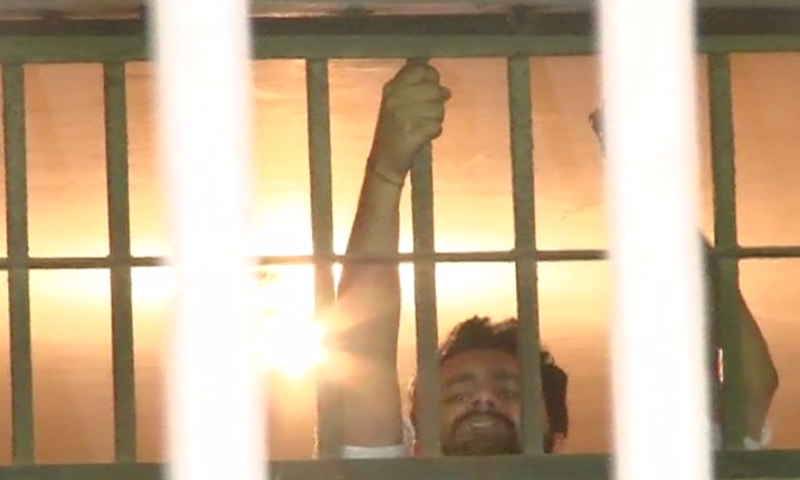
We can argue about whether what happened to Jibran Nasir and fellow peace activists on Thursday was ‘arrest’ or ‘detention’, but this will be arguing over semantics and entirely missing the point of the incident. Similarly, many immediately took to terming the action as evidence of government siding with militants – an understandable response at first glance. But taking a moment to consider the larger context, the actual meaning may be way worse.
Let us begin by recalling the scene. Jibran Nasir and fellow peace activists had gathered for a demonstration against Ahl-e-Sunnat Wal Jamaat, a Deobandi extremist group affiliated with banned terrorist group Sipah-e-Sahaba. Actually, ASWJ was also supposedly banned in 2012 for being an SSP front group, but as is widely known, some groups are banned and some groups are “banned” in name only. ASWJ is described by many as SSP’s ‘political wing’ and therefore tolerated.
Jibran Nasir’s group of peace activists were demonstrating against the recent suicide bomb attack at Shikarpur Imambargah and the Sindh government’s paltry response to the terrorist threat. These activists have been protesting and holding sit-ins outside Chief Minister House. This was obviously a thorn in the side of CM, and it is reported that the official reason for their arrest was “breaching the Chief Minister’s House security”, but there is a wider context that appears to be at work.
When Jibran Nasir’s group heard that ASWJ was taking out a demonstration in Karachi today, they turned their chants and slogans away toward the banned group. The crowd of ASWJ supporters then reportedly began marching towards CM House. The end result is easily predicted, except that the police intervened. This is where things get terrifying.
Upon learning that there may be a deadly clash between a group of anti-extremist peace activists and ASWJ, the authorities arrested the peace activists for their own protection.
Think about what this means: The authorities did not arrest the activists of a banned group. They arrested the members of civil society whose safety they thought was at risk.
In other words, the authorities – the government and the police – believed that they were powerless to stop the banned group.
On Thursday, the streets across the country were filled with supporters and leaders of supposedly ‘banned’ organizations. This was a public humiliation for the state, including both the civilian government and the military, who were left looking like they are incapable of backing up their words with actions against militant outfits. There is a creeping feeling among many, though, that the state not only “looks like” they are incapable of backing up their words with actions, they actually believe it. Or, in the words of one popular Twitter account:
The problem is that it is easier for JuD to shut down Pakistan than for Pakistan to shut down JuD.
— Dr Majorly PhD (@majorlyp) January 23, 2015
Jabran Nasir and his fellow peace activists were released by the police late Thursday night, but as long as jihadi groups like ASWJ and JUD control the streets, Pakistan will be a prison for the rest of us.
![]()






ashamed at the lack of leadership abilities among our political parties. all of them seem to bow down at the feet of extremists/murderers. Pity the pathetic life the people of this nation have to suffer because of their egos/greed
Interesting point of view. However, I disagree on one point. The state is not powerless to stop JUD of ASWJ. The state created them and have used their services. The state continues to beleive they are a necessary fighting force in case of external aggression as well as a useful tool to exert influence over Afghanistan. The state seems to feel the spillover effect of that mindset in terms of domestic terrorism is, at worst, a side effect.
Basically, the state created them and chooses not to shut them down.